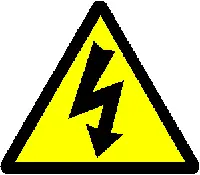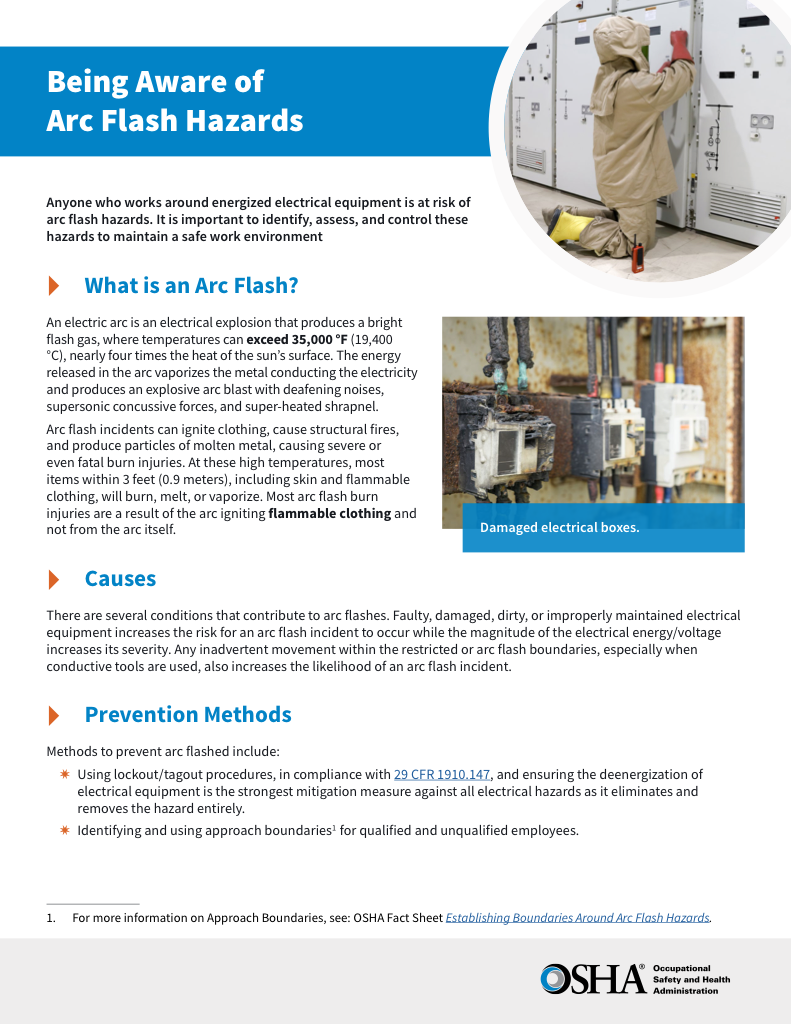Basic Electrical Safety Awareness

Arc Flash Training CSA Z462 - Electrical Safety Essentials
Our customized live online or in‑person group training can be delivered to your staff at your location.

- Live Online
- 6 hours Instructor-led
- Group Training Available
Download Our OSHA 4475 Fact Sheet – Being Aware of Arc Flash Hazards

- Identify root causes of arc flash incidents and contributing conditions
- Apply prevention strategies including LOTO, PPE, and testing protocols
- Understand OSHA requirements for training and equipment maintenance
Basic electrical safety involves identifying shock and arc flash risks, de-energizing systems, using personal protective equipment (PPE), and applying lockout/tagout procedures to protect workers and maintain compliance in industrial, commercial, and residential environments.
Quick Definition: Basic Electrical Safety
-
✅ Definition: Fundamental practices to prevent electrical hazards such as shocks, burns, and arc flashes.
-
✅ Key Practices: De-energizing equipment, using appropriate PPE, and adhering to lockout/tagout procedures.
-
✅ Importance: Essential for ensuring safety in environments where electrical systems are present.
Basic electrical safety is essential when working on systems, as contact with live electrical circuits can expose the human body to serious injury. An effective electrical safety program includes training on safe work practices, proper use of protective equipment, and methods for controlling hazards like arc flash and hazardous energy.
When working near circuit parts or using power tools, it is essential to recognize electrical hazards and follow strict procedures to prevent accidents and maintain a safe environment. Basic safety involves recognizing hazards associated with electrical equipment and taking necessary precautions to prevent shocks, burns, and arc flash incidents.
It focuses on employing safe work practices, utilizing proper personal protective equipment (PPE), and adhering to established safety procedures to minimize the risk of injury in residential, commercial, and industrial settings. Proper industrial electrical safety practices are a cornerstone of maintaining a safe working environment around energized equipment.
Request a Free Training Quotation
Basic Safety is a very important part of everyday life, but what has become an integral part of today’s modern world can harm you - or even kill you! Two of the most common causes of today’s accidents, such as electrical shock, is (1) lack of education, and/or (2) lack of appreciation of basic safety practices. Electrocutions (death by electric shock) occur when victims aren’t aware of basic safety, or these victims do possess knowledge of basic safety but they proceed anyway in spite of existing dangers. Conducting a thorough arc flash analysis enables the determination of the necessary personal protective equipment (PPE) to safeguard workers against hazards.
FREE EF Electrical Training Catalog
Download our FREE Electrical Training Catalog and explore a full range of expert-led electrical training courses.

- Live online and in-person courses available
- Real-time instruction with Q&A from industry experts
- Flexible scheduling for your convenience
What Are The Risks?
Dangers can occur very easily, which is why basic safety must be practiced. Accidents can happen when victims use unsafe or defective tools. Additionally, victims sometimes fail to de-energize or do not follow proper lockout and tagout procedures during equipment repair, inspections, or maintenance. Hence, they subject themselves to danger. Another reason accidents occur is that some workers are elevated in a position that allows them to come into contact with overhead power lines, resulting in electrocution. At home, basic accidents occur when outlets are overloaded with too many appliances or when a third prong (ground pin) on a three-pronged plug is removed in an attempt to fit the plug into a two-pronged outlet. This allows the faulted current to flow into a person, instead of travelling through the ground pin to the house's grounding system. Posting clear electrical safety signs around high-voltage areas enhances awareness and supports basic safety measures.
Using defective equipment can also lead to accidents. Faulty insulation, loose connections, defective parts, improper grounding, or using homemade extension cords can make a simple procedure turn into a trip to the hospital. Recognizing the potential for arc flash blast explosions is critical when training workers on basic afety protocols.
Basic Electrical Safety – Why practice basic safety?
Burns, physical injuries or damages to the nervous system are caused when electricity travels through your body and connects to its originating source. Electricity can travel via hand-to-hand, hand-to-foot or take a route through the heart thus damaging the most important organ in your body.
Basic Electrical Safety – How Can I Practice Basic Safety?
Here are a few ways to improve your Basic Electrical Safety:
- Minimize your risk to static shock:
-
Avoid cleaning your computer monitor or your television screen while turned on, an injury can occur
-
-
Follow OSHA or CSA Basic Safety work practices:
-
Electrical shock can occur while you’re at work, so avoid wet working conditions and use proper wiring and connectors.
-
Use ground-fault circuit interrupters because they can detect ground faults, identifying exactly where electricity is leaking.
-
Having a basic safety plan at work is also great basic safety.
-
-
Use safe equipment:
-
Don’t use damaged or modified equipment and always use equipment correctly (according to the manufacturer’s specifications)
-
Implementing lockout tagout procedures significantly reduces the risk of accidental contact during equipment servicing.







